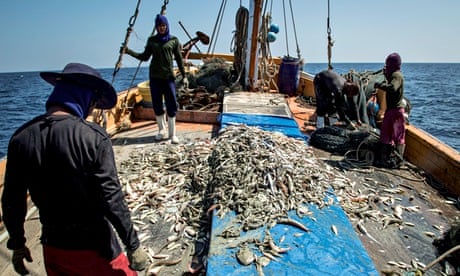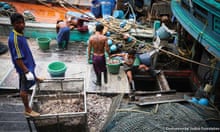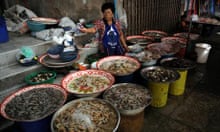Myo Zaw Do*, a Burmese migrant, was sold on to a fishing boat in March last year after being tricked by traffickers who had promised him work in a Thai pineapple factory. His ordeal lasted more than 10 months, during which he claims he was forced to work without pay and subjected to beatings by the captain.
His plight was uncovered during an investigation into rights abuses in the Thai fishing industry by the Environmental Justice Foundation (EJF), a UK-based NGO.
Thailand is the third-largest exporter of seafood in the world, sending nearly a billion euros (£8.2m) of fish to Europe and more than $1.5bn to the US each year. However, allegations of slavery and forced labour have dogged the sector in recent years.
The latest EJF report, Slavery at Sea (pdf), published on Tuesday, follows warnings about brutal labour conditions in the Thai fishing industry sounded by the UN's International Labour Organisation and Human Rights Watch (pdf).
Myo Zaw Do's case was recorded by the EJF last month, after he managed to escape and take refuge in a temple outside Bangkok. He says he was 20 when he left the small town of Kamarsay Sanpya in Burma to find work. He travelled to the border town of Myawaddy, where he paid traffickers to help him make an illegal crossing into Thailand.
He gave brokers $215 upfront and agreed to work off the rest of the fee, $140, in Thailand. He was among a group of 36 migrants from Burma undertaking the long forest trek into Thailand. Three were lost on the way, including an elderly man whom Myo Zaw Do believes was murdered when he became suspicious and refused to continue the journey.
Once across the border, the group was split by the traffickers. Eleven young women were divided into those who would be sold to food factories and those who would be sent to nightclubs and brothels, he says. Six men were transferred in two marked police cars, driven by men in plainclothes, to a port south of Bangkok.
Realising they had been tricked, the other men refused to work on the boats, but Myo Zaw Do says they were lured, one by one, to work on jobs near the broker's house. All six ended up aboard a vessel that headed out to sea.
"We were sold for $430 per person. I felt very depressed when I ended up on the boat. I felt I was in hell," Myo Zaw Do told researchers. He described regular beatings, including one in which his head was smashed so hard on to ice on the deck that he was left partially deaf.
Although the boat returned to port on occasion, Myo Zaw Do says escape was made hard by the close relationship between the local police and boat operators. Vessel owners would pay bribes to the officers to allow them to keep illegal workers. Escapees were returned to the boats or sold on to others offering a better price.
The EJF says Myo Zaw Do's case is one of several it has uncovered of slavery and extreme exploitation in the Thai fishing sector. "Migrant workers in the Thai fishing industry, many of them trafficked illegally, are suffering terrible abuses and all too often are denied their basic human rights," says the foundation's executive director, Steve Trent. "Our governments and the international seafood industry simply cannot continue to ignore this, they must demand immediate reform and action to stop these abuses or refuse Thai seafood that is produced by slaves."
In 2013, the Thai government agreed to tackle trafficking, partly in response to pressure from the US state department, which had the country on its official watchlist for labour abuses. It promised to increase inspection and enforcement. The EJF says its findings show not enough has been done.
*Myo Zaw Do is a pseudonym.



Comments (…)
Sign in or create your Guardian account to join the discussion